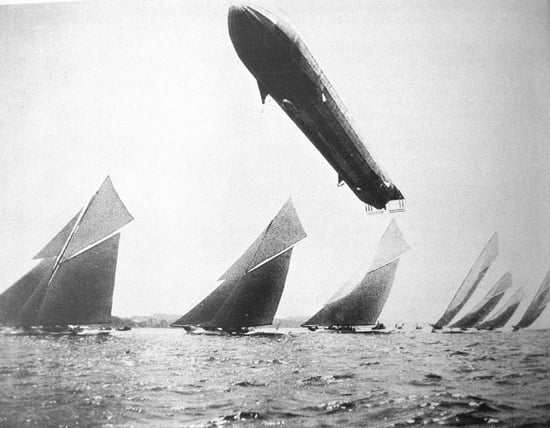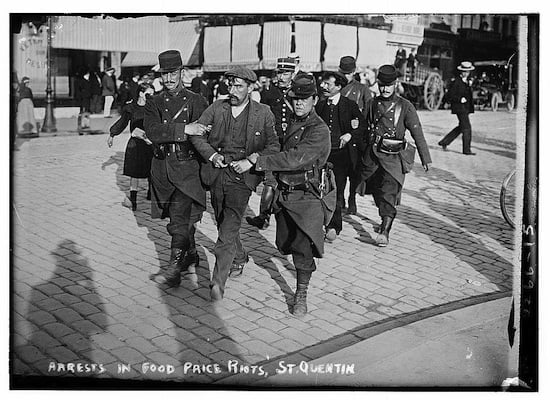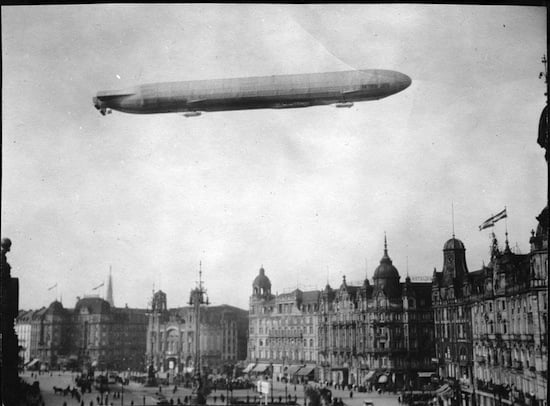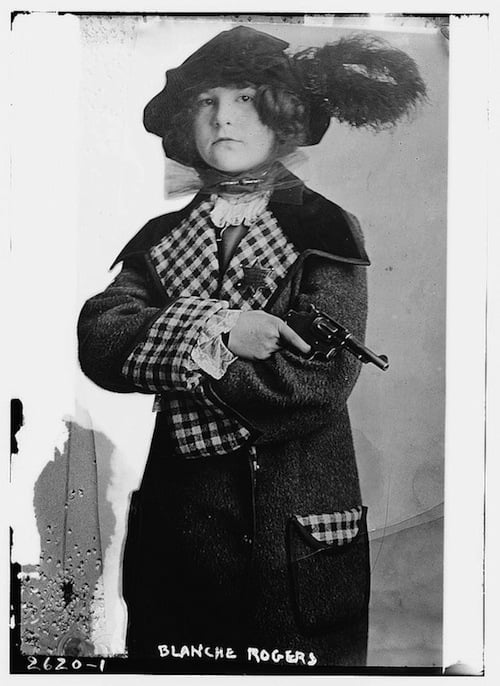With the Night Mail (8)
By:
May 9, 2012

HILOBROW is pleased to present the seventh installment of our serialization of Rudyard Kipling’s With the Night Mail (and his follow-up story, “As Easy as A.B.C.”). New installments will appear each Wednesday for 12 weeks.
With the Night Mail follows the exploits of an intercontinental mail dirigible battling the perfect storm. Between London and Quebec we learn that a planet-wide Aerial Board of Control (A.B.C.) now enforces a technocratic system of command and control not only in the skies but in world affairs, too. A follow-up story, “As Easy As A.B.C.,” recounts what happens when agitators in Chicago demand a return of democracy: The A.B.C. sends zeppelins armed with sound weapons to subdue not the agitators, but a mob who would destroy them! With the Night Mail is set in 2000, and it first appeared in 1905; 2012 marks the centennial of the first publication of “As Easy As A.B.C.”
In June, HiLoBooks will publish a beautiful new edition of With the Night Mail (and “As Easy as A.B.C.”), checked against the 1909 first published edition (Doubleday), with an Introduction by science fiction author Matthew De Abaitua, and an Afterword by science fiction author Bruce Sterling. SUPPLIES ARE LIMITED! CLICK HERE TO ORDER YOUR COPY.
In June, HiLoBooks will publish a beautiful new edition of With the Night Mail (and “As Easy as A.B.C.”), checked against the 1909 first published edition (Doubleday), with an Introduction by science fiction author Matthew De Abaitua, and an Afterword by science fiction author Bruce Sterling.
SUBSCRIBE to HILOBROW’s serialized fiction via RSS.
LAST WEEK: “(ADVERTISING SECTION — SAFETY WEAR FOR AERONAUTS). High Level Flickers: Pure para kit with cellulose seat and shoulder-pads, weighted to balance. Unequalled for all drop-work. Our trebly resilient heavy kit is the ne plus ultra of comfort and safety. Gas-buoyed, waterproof, hail-proof, non-conducting Flickers with pipe and nozzle fitting all types of generator. Graduated tap on left hip.”
THIS WEEK: We begin serializing “As Easy as A.B.C.”.
ALL EXCERPTS: 1 | 2 | 3 | 4 | 5 | 6 | 7 | 8 | 9 | 10 | 11 | 12
“[The A.B.C.], that semi-elected, semi-nominated body of a few score persons of both sexes, controls this planet. ‘Transportation is Civilization,’ our motto runs. Theoretically, we do what we please so long as we do not interfere with the traffic and all it implies. Practically, the A. B. C. confirms or annuls all international arrangements and, to judge from its last report, finds our tolerant, humorous, lazy little planet only too ready to shift the whole burden of private administration on its shoulders.”—With the Night Mail
Isn’t it almost time that our Planet took some interest in the proceedings of the Aerial Board of Control? One knows that easy communications nowadays, and lack of privacy in the past, have killed all curiosity among mankind, but as the Board’s Official Reporter I am bound to tell my tale.
At 9.30 A.M., August 26, A.D. 2065, the Board, sitting in London, was informed by De Forest that the District of Northern Illinois had riotously cut itself out of all systems and would remain disconnected till the Board should take over and administer it direct.

Every Northern Illinois freight and passenger tower was, he reported, out of action; all District main, local, and guiding lights had been extinguished; all General Communications were dumb, and through traffic had been diverted. No reason had been given, but he gathered unofficially from the Mayor of Chicago that the District complained of ‘crowd-making and invasion of privacy.’
As a matter of fact, it is of no importance whether Northern Illinois stay in or out of planetary circuit; as a matter of policy, any complaint of invasion of privacy needs immediate investigation, lest worse follow.
By 9.45 A.M. De Forest, Dragomiroff (Russia), Takahira (Japan), and Pirolo (Italy) were empowered to visit Illinois and ‘to take such steps as might be necessary for the resumption of traffic and all that that implies.’ By 10 A.M. the Hall was empty, and the four Members and I were aboard what Pirolo insisted on calling ‘my leetle godchild’— that is to say, the new Victor Pirolo. Our Planet prefers to know Victor Pirolo as a gentle, grey-haired enthusiast who spends his time near Foggia, inventing or creating new breeds of Spanish-Italian olive-trees; but there is another side to his nature — the manufacture of quaint inventions, of which the Victor Pirolo is perhaps, not the least surprising. She and a few score sister-craft of the same type embody his latest ideas. But she is not comfortable. An A.B.C. boat does not take the air with the level-keeled lift of a liner, but shoots up rocket-fashion like the ‘aeroplane’ of our ancestors, and makes her height at top-speed from the first. That is why I found myself sitting suddenly on the large lap of Eustace Arnott, who commands the A.B.C. Fleet. One knows vaguely that there is such a thing as a Fleet somewhere on the Planet, and that, theoretically, it exists for the purposes of what used to be known as ‘war.’ Only a week before, while visiting a glacier sanatorium behind Gothaven, I had seen some squadrons making false auroras far to the north while they manoeuvred round the Pole; but, naturally, it had never occurred to me that the things could be used in earnest.
Said Arnott to De Forest as I staggered to a seat on the chart-room divan: ‘We’re tremendously grateful to ’em in Illinois. We’ve never had a chance of exercising all the Fleet together. I’ve turned in a General Call, and I expect we’ll have at least two hundred keels aloft this evening.’
‘Well aloft?’ De Forest asked.
‘Of course, sir. Out of sight till they’re called for.’
Arnott laughed as he lolled over the transparent chart-table where the map of the summer-blue Atlantic slid along, degree by degree, in exact answer to our progress. Our dial already showed 320 m.p.h. and we were two thousand feet above the uppermost traffic lines.
‘Now, where is this Illinois District of yours?’ said Dragomiroff. ‘One travels so much, one sees so little. Oh, I remember! It is in North America.’
De Forest, whose business it is to know the out districts, told us that it lay at the foot of Lake Michigan, on a road to nowhere in particular, was about half an hour’s run from end to end, and, except in one corner, as flat as the sea. Like most flat countries nowadays, it was heavily guarded against invasion of privacy by forced timber — fifty-foot spruce and tamarack, grown in five years. The population was close on two millions, largely migratory between Florida and California, with a backbone of small farms (they call a thousand acres a farm in Illinois) whose owners come into Chicago for amusements and society during the winter. They were, he said noticeably kind, quiet folk, but a little exacting, as all flat countries must be, in their notions of privacy. There had, for instance, been no printed news-sheet in Illinois for twenty-seven years. Chicago argued that engines for printed news sooner or later developed into engines for invasion of privacy, which in turn might bring the old terror of Crowds and blackmail back to the Planet. So news-sheets were not.
‘And that’s Illinois,’ De Forest concluded. ‘You see, in the Old Days, she was in the fore-front of what they used to call “progress,” and Chicago —’
‘Chicago?’ said Takahira. ‘That’s the little place where there is Salati’s Statue of the Nigger in Flames. A fine bit of old work.’
‘When did you see it?’ asked De Forest quickly. ‘They only unveil it once a year.’
‘I know. At Thanksgiving. It was then,’ said Takahira, with a shudder. ‘And they sang “MacDonough’s Song,” too.’
‘Whew!’ De Forest whistled. ‘I did not know that! I wish you’d told me before. “MacDonough’s Song” may have had its uses when it was composed, but it was an infernal legacy for any man to leave behind.’
‘It’s protective instinct, my dear fellows,’ said Pirolo, rolling a cigarette. ‘The Planet, she has had her dose of popular government. She suffers from inherited agoraphobia. She has no — ah — use for crowds.’
Dragomiroff leaned forward to give him a light. ‘Certainly,’ said the white-bearded Russian, ‘the Planet has taken all precautions against crowds for the past hundred years. What is our total population today? Six hundred million, we hope; five hundred, we think; but — but if next year’s census shows more than four hundred and fifty, I myself will eat all the extra little babies. We have cut the birth-rate out — right out! For a long time we have said to Almighty God, “Thank You, Sir, but we do not much like Your game of life, so we will not play.”‘
‘Anyhow,’ said Arnott defiantly, ‘men live a century apiece on the average now.’
‘Oh, that is quite well! I am rich — you are rich — we are all rich and happy because we are so few and we live so long. Only I think Almighty God He will remember what the Planet was like in the time of Crowds and the Plague. Perhaps He will send us nerves. Eh, Pirolo?’
The Italian blinked into space. ‘Perhaps,’ he said, ‘He has sent them already. Anyhow, you cannot argue with the Planet. She does not forget the Old Days, and — what can you do?’
‘For sure we can’t remake the world.’ De Forest glanced at the map flowing smoothly across the table from west to east. ‘We ought to be over our ground by nine to-night. There won’t be much sleep afterwards.’
On which hint we dispersed, and I slept till Takahira waked me for dinner. Our ancestors thought nine hours’ sleep ample for their little lives. We, living thirty years longer, feel ourselves defrauded with less than eleven out of the twenty-four.

By ten o’clock we were over Lake Michigan. The west shore was lightless, except for a dull ground-glare at Chicago, and a single traffic-directing light — its leading beam pointing north — at Waukegan on our starboard bow. None of the Lake villages gave any sign of life; and inland, westward, so far as we could see, blackness lay unbroken on the level earth. We swooped down and skimmed low across the dark, throwing calls county by county. Now and again we picked up the faint glimmer of a house-light, or heard the rasp and rend of a cultivator being played across the fields, but Northern Illinois as a whole was one inky, apparently uninhabited, waste of high, forced woods. Only our illuminated map, with its little pointer switching from county to county, as we wheeled and twisted, gave us any idea of our position. Our calls, urgent, pleading, coaxing or commanding, through the General Communicator brought no answer. Illinois strictly maintained her own privacy in the timber which she grew for that purpose.
‘Oh, this is absurd!’ said De Forest. ‘We’re like an owl trying to work a wheat-field. Is this Bureau Creek? Let’s land, Arnott, and get hold of some one.’
We brushed over a belt of forced woodland — fifteen-year-old maple sixty feet high — grounded on a private meadow-dock, none too big, where we moored to our own grapnels, and hurried out through the warm dark night towards a light in a verandah. As we neared the garden gate I could have sworn we had stepped knee-deep in quicksand, for we could scarcely drag our feet against the prickling currents that clogged them. After five paces we stopped, wiping our foreheads, as hopelessly stuck on dry smooth turf as so many cows in a bog.
‘Pest!’ cried Pirolo angrily. We are ground-circuited. And it is my own system of ground-circuits too! I know the pull.’
‘Good evening,’ said a girl’s voice from the verandah. ‘Oh, I’m sorry! We’ve locked up. Wait a minute.’
We heard the click of a switch, and almost fell forward as the currents round our knees were withdrawn.
The girl laughed, and laid aside her knitting. An old-fashioned Controller stood at her elbow, which she reversed from time to time, and we could hear the snort and clank of the obedient cultivator half a mile away, behind the guardian woods.
‘Come in and sit down,’ she said. ‘I’m only playing a plough. Dad’s gone to Chicago to —Ah! Then it was your call I heard just now!’
She had caught sight of Arnott’s Board uniform, leaped to the switch, and turned it full on.
We were checked, gasping, waist-deep in current this time, three yards from the verandah.
‘We only want to know what’s the matter with Illinois,’ said De Forest placidly.
‘Then hadn’t you better go to Chicago and find out?’ she answered. ‘There’s nothing wrong here. We own ourselves.’

‘How can we go anywhere if you won’t loose us?’ De Forest went on, while Arnott scowled. Admirals of Fleets are still quite human when their dignity is touched.
‘Stop a minute — you don’t know how funny you look!’ She put her hands on her hips and laughed mercilessly.
‘Don’t worry about that,’ said Arnott, and whistled. A voice answered from the Victor Pirolo in the meadow.
‘Only a single-fuse ground-circuit!’ Arnott called. ‘Sort it out gently, please.’
We heard the ping of a breaking lamp; a fuse blew out somewhere in the verandah roof, frightening a nest full of birds. The groud-circuit was open. We stooped and rubbed our tingling ankles.
‘How rude — how very rude of you!’ the maiden cried.
‘Sorry, but we haven’t time to look funny,’ said Arnott. ‘We’ve got to go to Chicago; and if I were you, young lady, I’d go into the cellars for the next two hours, and take mother with me.’
Off he strode, with us at his heels, muttering indignantly, till the humour of the thing struck and doubled him up with laughter at the foot of the gangway ladder.
NEXT WEEK: “The beams of light leaped down again, and danced, solemnly and awfully, a stilt-dance, sweeping thirty or forty miles left and right at each stiff-legged kick, while the darkness delivered itself — there is no scale to measure against that utterance — of the tune to which they kept time. Certain notes — one learnt to expect them with terror — cut through one’s marrow, but, after three minutes, thought and emotion passed in indescribable agony.”
NOTE: First published in various Sunday papers in the United States on 25 February and 12 March 1912 and in the London Magazine of March and April the same year with illustrations by F. Gardner. Collected in A Diversity of Creatures (1917); it is accompanied by “MacDonough’s Song”, the last verse of which is included in the text of the story in all printings. The full text of twenty-nine lines appeared in A Diversity of Creatures in 1917. More notes about the story here and here.
RADIUM AGE SCIENCE FICTION: “Radium Age” is HILOBROW’s name for the 1904–33 era, which saw the discovery of radioactivity, the revelation that matter itself is constantly in movement — a fitting metaphor for the first decades of the 20th century, during which old scientific, religious, political, and social certainties were shattered. This era also saw the publication of genre-shattering writing by Edgar Rice Burroughs, Sax Rohmer, E.E. “Doc” Smith, Jack London, Arthur Conan Doyle, Aldous Huxley, Olaf Stapledon, Karel Čapek, H.P. Lovecraft, Charlotte Perkins Gilman, Yevgeny Zamyatin, Philip Gordon Wylie, and other pioneers of post-Verne/Wells, pre-Golden Age “science fiction.” More info here.
HILOBOOKS: The mission of HiLoBooks is to serialize novels on HiLobrow; and also, as of 2012, operating as an imprint of Richard Nash’s Cursor, to reissue Radium Age science fiction in beautiful new print editions. So far, we have published Jack London’s The Scarlet Plague, Rudyard Kipling’s With the Night Mail (and “As Easy as A.B.C.”), Arthur Conan Doyle’s The Poison Belt, H. Rider Haggard’s When the World Shook, Edward Shanks’s The People of the Ruins, William Hope Hodgson’s The Night Land, and J.D. Beresford’s Goslings. Forthcoming: E.V. Odle’s The Clockwork Man, Cicely Hamilton’s Theodore Savage, and Muriel Jaeger’s The Man with Six Senses. For more information, visit the HiLoBooks homepage.
READ: You are reading Rudyard Kipling’s With the Night Mail and “As Easy As A.B.C.” Also read our serialization of: Jack London’s The Scarlet Plague | H. Rider Haggard’s When The World Shook
ORIGINAL FICTION: HILOBROW has serialized three novels: James Parker’s The Ballad of Cocky The Fox (“a proof-of-concept that serialization can work on the Internet” — The Atlantic) and Karinne Keithley Syers’s Linda Linda Linda. We also publish original stories and comics.
